| Srl | Item |
| 1 |
ID:
133600
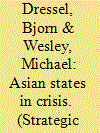

|
|
|
|
|
| Publication |
2014.
|
| Summary/Abstract |
Problems common to many Asian states suggest a pattern of crisis in Asia. The evidence suggests that the root cause is the similarity in the patterns of political development of postcolonial states. In Asia such states have attempted to reconcile state strength and internal diversity by constructing a triangular balance between identity construction, hegemonic governance and economic development. Unfortunately, this fragile balance eroded as state structures matured and economies grew, which increasingly exposed countries to escalating crises of legitimacy and instability. By highlighting changes in the postcolonial state compact within the region, this article seeks to advance both the understanding among theorists of political developments in the region and the understanding among those who govern of the roots of the current crisis.
|
|
|
|
|
|
|
|
|
|
|
|
|
|
|
|
| 2 |
ID:
025437
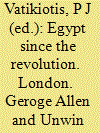

|
|
|
|
|
| Publication |
London, Geroge Allen and Unwin Ltd, 1968.
|
| Description |
195p.hbk
|
| Series |
Studies on Modern Asia and Africa
|
|
|
|
|
|
|
|
|
|
|
|
Copies: C:1/I:0,R:0,Q:0
Circulation
| Accession# | Call# | Current Location | Status | Policy | Location |
| 001112 | 962.05/VAT 001112 | Main | On Shelf | General | |
|
|
|
|
| 3 |
ID:
131383
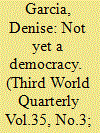

|
|
|
|
|
| Publication |
2014.
|
| Summary/Abstract |
Brazil is considered one of the more successful examples of democratic transition and consolidation in the developing world; and one of the fastest developing and emerging countries. This article contends that Brazil is not yet a fully established democracy, because it lacks the proper civilian checks and balances ensuring full authority over the armed forces, police and secret services. There are five main reasons for this: first, the Constitution does not provide a generalised guide for the institution of civilian oversight. Second, a change of cultural perceptions vis-à-vis the security sector entities is needed. Third, piecemeal rather than holistic or comprehensive legal and institutional transformation has occurred, with little civilian oversight of the armed forces. Fourth, the large structures still held by each of the armed forces require re-articulation and fundamental transformation. Finally, there is no fully fledged civil society participation in security sector life through the media and academia. These problems weaken democracy in Brazil. The course of democratisation in Brazil and the role the security sector played in the transition are examined before discussion of some of the more recent legal and political developments in the security sector, as part of the democratic consolidation. The conclusion presents insights from Brazil's experience and lessons for states facing similar transition challenges.
|
|
|
|
|
|
|
|
|
|
|
|
|
|
|
|
| 4 |
ID:
179362
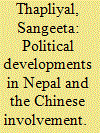

|
|
|
|
|
| Summary/Abstract |
The dissolution of parliament in Nepal has brought the focus back on its fragile democracy. After years of political instability, a new constitution and one party with absolute majority in the general elections gave the impression and hope that the future looked promising for political stability. But that did not take place. Nepalese politics have remained volatile. The article makes an assessment and suggests the path for India keeping in view Chinese machinations.
|
|
|
|
|
|
|
|
|
|
|
|
|
|
|
|
| 5 |
ID:
164476
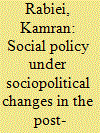

|
|
|
|
|
| Summary/Abstract |
The dialectic relation between sociocultural changes and political developments in the post-revolutionary Iran is discussed in the article which shows how the social policy of the governments has changed under this relation. The 1979 Islamic Revolution brought about a wave of tendency toward a specific discourse that can be called “downtrodden discourse” wherein the poor and deprived are the center of attention, and the resources of society are mainly mobilized in the direction of improving their economic and social conditions. Furthermore, the eight-year Iran–Iraq War (1980—1988) strengthened this discourse, and the new political system relied on the lower class of the society to push the war forward, stabilize the foundations of its power, and solidify its ideology. After the war, Iran had three governments with three different approaches toward social policy. During the era of Hashemi Rafsanjani (1989–1997), no special attention was paid to social policy since economic growth and development was the focus of the government activity. Under Mohammed Khatami (1997–2005), special attention was paid to comprehensive social policy, but due to internal political and social tensions, his government failed to implement its codified social policy. Although Ahmadinejad (2005–2013) intended to pay special attention to social policy, the actions taken by his government not only failed to reduce poverty but they also pushed the significant part of the middle class below the poverty line.
|
|
|
|
|
|
|
|
|
|
|
|
|
|
|
|